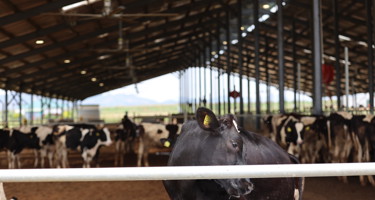
Dear Reader
Welcome to the first edition of our 2025 Dairy Development Newsletter! This year marks a period of transformation and growth as we build on our strengths to further enhance our dairy operations and community engagement. The year is already off to a promising start with renewed optimism and energy, and I am delighted to share some exciting updates from the Arla Farm, which reaffirm our commitment to excellence at Arla Nigeria.
We are pleased to announce the appointment of a new Farm Manager, Mr. Robert Edwards, an experienced farmer who brings with him decades of solid experience in running large dairy farm operations. His expertise and leadership will be instrumental in driving our operational improvements as we continue to grow towards our ambition of becoming Nigeria's largest and most sustainable dairy farm.
In tandem, we have initiated plans to enhance veterinary services on the farm, ensuring our animals receive the highest standard of care. With these measures, we aim to bolster animal welfare, health and overall production quality.
Recognizing the critical role of animal nutrition in dairy farming, we are advancing our efforts to improve feed and fodder quality for dairy farming in Nigeria. By investing in better sourcing, production, and collaborating with research partners (such as NAPRi and ILRI) and seed companies (such as SeedCo and DLF Seeds), we are working to find even better plants for all Nigerian dairy farmers.
In our continuous effort to nurture the next generation, we are also introducing a student internship program at the Arla Farm for dairy science and veterinary students. This initiative will provide hands-on learning experiences and foster closer collaboration between academia and the dairy industry. Additionally, we plan to host Open Days for both students and small and large holder farmers, creating valuable opportunities for knowledge exchange and community engagement. We believe that these efforts will not only benefit our farm but also contribute to the broader agricultural community by sharing knowledge and best practices.
Another key priority for us is job creation and economic empowerment in our host community - Damau. Through our growing operations and partnerships, we are actively contributing to employment generation, skills development, and community upliftment, ensuring that the impact of our work extends far beyond dairy production.
While we are excited about these advancements, we remain vigilant in addressing ongoing challenges. The recent scare of foot and mouth disease has underscored the importance of rigorous biosecurity measures. We are committed to tightening our processes to protect the health of our livestock and ensure the sustainability of our operations.
As we look forward to the rest of the year, we are filled with enthusiasm for the potential it holds and the opportunities to further innovate and excel in our dairy operations. I extend my heartfelt wishes to all our stakeholders for a successful and rewarding year ahead as we continue to set high standards in dairy excellence.

Peder Pedersen MD, Arla Global Dairy Products Ltd.
Animal Health: The Importance of Taking the Right Steps
When running a dairy farm in Africa, several things need to be done differently compared to a similar-sized farm in Europe, mainly in terms of preventive healthcare and biosecurity. This is due to the fact that many cattle diseases, such as FMD (Foot and Mouth Disease) and LSDV (Lumpy Skin Disease Virus), are still prevalent in Africa but have been more or less eradicated or are under good control in Europe. Additionally, during the dry season, the migration or movement of nomadic herds, with tens if not hundreds of thousands of animals in search of feed, contributes significantly to disease spreading.
To operate effectively alongside these challenging diseases, each dairy farm in Africa needs to take several steps:
Biosecurity
The first step is to do all it takes to protect the herd from contagious diseases. Therefore, good biosecurity rules are even more important at dairy farms in Africa than elsewhere. Restrictions on vehicles, people, and other animals close to the herd are essential, but if contact is unavoidable, hygienic procedures and disinfection are crucial. At the Arla farm, any animals other than the cattle on the farm are simply prohibited, regardless of breed or type. This is necessary to reduce the risk that other animals, which might be contagious, can harm the cattle on the farm. Additionally, all vehicles entering the site are properly disinfected to reduce the risk of contagious material entering the farm. All people working around the animals need to go through a special biosecurity house and only use farm-approved clothes and PPE. Guests visiting the farm also have to go through the same measures and put on single-use protective clothes.
Vaccination Programs
Secondly, every farm should have a good vaccination program to reduce the risk of animals getting sick and, if they do get infected, to lessen the impact of the disease. However, the fact that some tropical disease agents have not been properly monitored and characterized from field outbreaks may not guarantee vaccination as a solution. At the Arla Farm, the vaccination program for 2025 includes regular and systematic vaccines to prevent diseases like FMD, LSDV, CBPP (Contagious Bovine PleuroPneumonia), BQ (Black Quarter), BV (Bovine Vaccinia), Anthrax, and BHV (Bovine HerpesVirus). The veterinary team on the farm continuously monitors the situation in the nearby areas of the Arla Farm to react if any other vaccines or actions need to be taken.
Quick Reaction
Thirdly, we know that even if you try your best to prevent diseases from entering the herd, it will probably happen at some point in time. The dairy farm, therefore, needs to be set up professionally in a way that makes it easy to react to suspicions of a disease outbreak. Employees should be well-educated in recognizing the most common diseases so that the reaction time from first suspicion to action is limited. Suspected animals or sections of barns can then be isolated, and action taken on treatment etc.
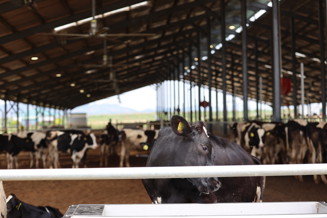
Our Quest for the Superfood for Cattle Continues
Last year, we embarked on a brand new journey for Arla, one of many initiatives related to the Arla Farm. This time, our focus was on finding more suitable crops for our animals, as most of the available seeds in Nigeria are primarily intended for human use—meaning they are for plants that serve as food for people. Consequently, the corn we harvest for silage isn’t the ideal variant, as it grows quite tall and dries up quickly. While this quality is beneficial for corn production for human consumption, it isn’t optimal for a dairy farm producing silage. Additionally, many other seeds have been developed with humans in mind.
However, our current focus is on high-producing cattle, which means we are searching for plant types and variants that better meet our cattle's nutritional needs. As mentioned before, we began this search in 2024, in collaboration with NAPRI (National Animal Production Research Institute), SeedCo and DLF Seeds (a Danish seed company), by initiating a split plot trial with over 20 different types of seeds. This was our first attempt, and while the results could have been better, we are not discouraged. We will continue to search for plants that are primarily beneficial for cattle performance.
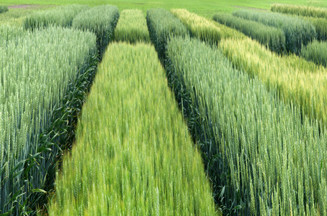
Don't Let the Cattle Chop and Mix the Fodder for You
In Nigeria, as in many other countries, many farmers miss out on numerous benefits for their cattle simply by not chopping the fodder into small particles and mixing it properly. The most common reason dairy farmers do not chop and mix the fodder is that when cattle graze outside, the feed is naturally "chopped" into small particles and mixed by the animals themselves. But why not allow cattle to do the same when they are fed at the feeding table inside a barn? While this method does work, it is less efficient.
When feeding cattle, farmers have already invested in feed materials, so it is essential to optimize the feeding process. By chopping the feed into small particles, dairy farmers gain several benefits: the feed becomes more uniform, and the animals cannot easily choose what they want to eat, forcing them to consume all the feed the farmer has deemed important for their diet. This leads to fewer changes in the rumen pH, better feed utilization, and improved digestive health in the cattle. Additionally, chopping the feed well reduces leftovers, as the animals cannot sort out the particles they prefer.
There are several more benefits to chopping and mixing feed, and perhaps the most important one is that it allows dairy farmers to feed their animals various industry residues that cannot be used or converted into food for humans. These residues include oil seed cake from plant oil production, cotton seed cake from cotton production, and various types of bran left over from food mills processing rice, wheat, and other grains. Cows can also digest and utilize leftovers from breweries where alcohol is made.
In short, cows are extremely flexible when it comes to food, as long as it is provided in the right format. By feeding them different leftovers, that are more or less not useful for humans, they can help reduce the carbon footprint of the relevant production by converting the leftovers into milk and meat.
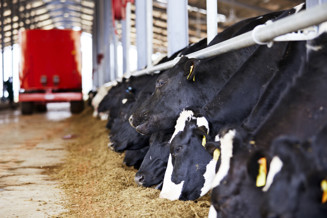
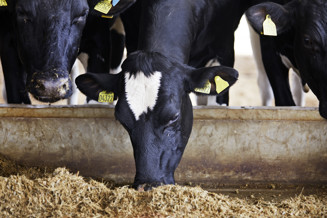
Arla Bulls: Spreading Good Genes Around Nigeria
Even with the use of sexed semen from Viking Genetics, semen that has been screened and selected to increase the likelihood of producing female calves, bulls are still occasionally born at the Arla farm. Since the first animal was born on site in the fall of 2023, there have been numerous successful births. Out of 218 calves, only 14 have been bulls, resulting in a 93.6% ratio of female calves!
The bull calves are a bonus for us at the Arla Dairy Farm, so we sell them to farmers looking to improve their herds. Recently, we sold the first batch of four bulls born in late 2023, and they are already mating with heifers and cows at different farms in Nigeria. We are confident these bulls will sire great calves that will be productive in the near future.
We congratulate the new farmer owners on this step into the future and look forward to having more bulls available for sale later this year for other interested farmers.

Creating Jobs and Driving Economic Growth in Damau
Our commitment to sustainable dairy development goes beyond producing high-quality dairy products. It extends to creating meaningful employment opportunities that uplift communities.
Through our operations at the Arla Farm in Damau, Kaduna and our upcoming yoghurt factory, we are contributing to Nigeria’s economic growth by generating jobs across various levels of the value chain. The Arla Farm in Damau has provided direct employment for over 30 members of the local community, empowering them with skills in modern dairy farming and farm management. From farmhands and stock handlers to logistics and administrative personnel, our presence has not only enhanced local livelihoods but also fostered knowledge transfer in sustainable dairy practices.
As we prepare to launch the Yoghurt factory, even more opportunities have emerged, reinforcing our commitment to strengthening Nigeria’s dairy sector. This facility will create jobs in production, quality control, and supply chain management, further integrating local talent into the growing dairy industry.
By prioritizing local employment and skills development, Arla is playing a key role in shaping a more self-sufficient dairy sector in Nigeria—one that supports economic resilience while ensuring a sustainable future for dairy farming.
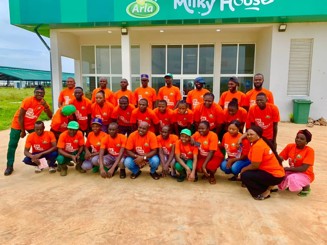

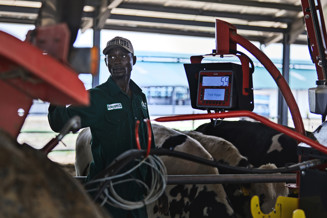
Thank you for your interest in working with us!
In February, we advertised the vacancy of a veterinarian position at the Arla Farm on various platforms. It was amazing to see that within just three days, we received nearly 60 applications from veterinarians across the country. The application period closed on March 14th, and we indeed received many good applications. We are grateful for the positive response to our advertisement and believe it reflects the strong interest people have in working with us.
Maiden Lecture at the University of Abuja
Recently, Snorri Sigurdsson, the Senior Manager for Raw Milk Supply & Production at Arla in Nigeria, had the honour of delivering the inaugural lecture at the Center for Dairy Studies at the University of Abuja.
His lecture marked the beginning of exciting times at the university, with a renewed focus on dairy farming and production. The title of his speech was "Creating the Future of Dairy by Boosting Nigeria's 'White Gold' Production." During the lecture, he emphasized the need for dairy farmers to explore all possible methods to increase production per animal. The Arla farm utilizes a foreign breed that produces up to 20 times more milk per day than the local cow breeds in Nigeria. Furthermore, there are many other breeds available in other countries that are undoubtedly better suited for milk production than the current local breeds.
The young students asked numerous questions, and after the lecture, there was a lively discussion about the future and strategies for successfully increasing Nigeria's milk production.
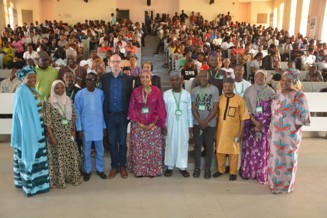
In Other News
Productive Engagement with the Kaduna State Government
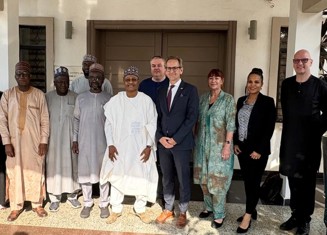
Last month, a team from Arla Foods Nigeria, led by our MD Mr. Peder Pedersen, alongside the Danish Ambassador to Nigeria, Mr. Jens Ole Bach Hansen and the Danish Sector Counsellor for Food & Agriculture, Mrs. Sanne Chipeta, had the honour of meeting with the Executive Governor of Kaduna State, H.E. Senator Uba Sani and the Honourable Commissioner of Agriculture Mr. Murtala Dabo.
This highly anticipated meeting served as an important platform for advancing discussions on a joint project aimed at empowering local farmer communities located around the Arla Farm in Damau, Kaduna State and to explore new opportunities for collaboration to drive the project forward.
We are excited about the progress made and the potential impact this partnership will have on the local dairy development in Kaduna State.
Air Force War College Visits the Arla Farm
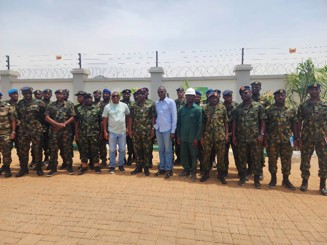
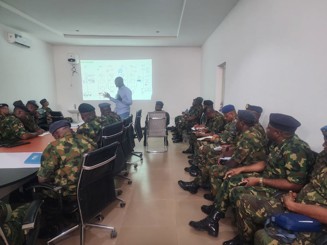

On 14th March 2025, we had the honour of hosting a delegation of 40 military personnel from the Air Force War College Nigeria, led by Air Vice Marshall PB Philips, at the Arla Damau site. The visit was a study tour conducted by the College, in line with the theme, “Technological Innovation and Sustainable Food Security in Nigeria.” It aimed to help participants understand the agricultural value chain’s contribution to national security, and according to the College, our Damau site was chosen because of its strategic position and recent commendable feats.
The visitors were received by our new farm manager, Mr. Robert Edwards, who warmly welcomed them to the Arla Damau site. This was followed by a comprehensive presentation on our farm and new yoghurt factory, given by our Dairy Site Manager, Mr. Samuel Ewarts. The delegation then engaged in a lively Q&A session, and the Commandant concluded the segment with the presentation of a plaque to the Arla team. Afterwards, the group embarked on a guided tour of our facilities.
We are delighted that the officers had such an engaging visit to our farm. We welcome more visitors to the farm, to experience first-hand our state-of-the-art facilities and leading dairy practices.
Visit From Our International Leadership Team

From the 4th to the 6th of March 2025, we had the pleasure of hosting the Arla International Leadership Team at our Lagos office. The visit was filled with engaging strategic sessions that provided excellent platforms to present our progress, exchange insights, and align on our 2025 ambitions.
The visit included deep-dive strategy sessions and engaging discussions on how we can continue to bring natural, nutritious dairy to Nigerian households. These interactions reinforced our commitment to sustainable growth, innovation, and collaboration.
A big thank you to our leadership team for their invaluable support in driving our mission forward everyday. Together, we are shaping the future of dairy in Nigeria!